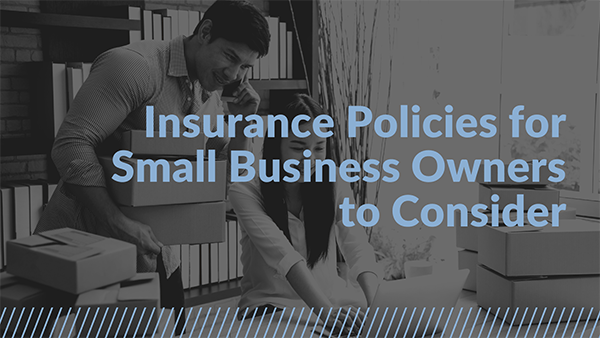Index Surge: Amplifying Your Insights
Stay updated with the latest trends and news across various industries.
Protecting Your Dreams: Why Small Businesses Can't Afford to Skip Insurance
Discover why skipping insurance could shatter your small business dreams! Protect your future—learn essential coverage strategies now.
Essential Insurance Types Every Small Business Should Consider
Every small business should consider various types of insurance to protect themselves from potential risks and liabilities. One of the essential insurance types is General Liability Insurance. This type of insurance guards against legal claims for bodily injury, property damage, and personal injury that may arise during normal business operations. Additionally, Property Insurance is crucial; it covers damage to your business premises and assets due to risks such as fire, theft, or natural disasters.
Another important coverage is Workers' Compensation Insurance, which is vital if you have employees. This insurance provides benefits to workers who are injured on the job, ensuring that your business is compliant with legal requirements. Lastly, consider Professional Liability Insurance, especially if your business offers services or advice. This type of insurance protects against claims of negligence or inadequate work, making it indispensable for service-oriented businesses.

How to Choose the Right Insurance Coverage for Your Small Business
Choosing the right insurance coverage for your small business is crucial to safeguarding your assets and ensuring long-term success. Begin by conducting a thorough risk assessment of your business operations. Identify potential liabilities and vulnerabilities that could expose your business to financial loss.
Next, consider the different types of insurance policies applicable to your industry. Common options include general liability insurance, property insurance, and workers' compensation insurance. Make a checklist of the policies that best address your specific needs and consult with a reputable insurance agent who can offer tailored advice based on your unique situation.
What Risks Are You Exposing Your Business to Without Insurance?
Operating a business without insurance can expose you to significant risks that could jeopardize your financial stability and overall operations. Without the proper coverage, you are leaving your business vulnerable to unforeseen events such as accidents, natural disasters, or liability claims. For instance, if a customer slips and falls on your premises, the medical expenses and potential lawsuit can have dire consequences. Additionally, the lack of property insurance means that a fire, theft, or other disasters could wipe out your assets overnight.
Furthermore, the financial implications of operating without insurance can extend beyond immediate costs. Many companies face regulatory penalties for failing to maintain adequate coverage, particularly when it comes to employee-related issues like workers' compensation. This not only affects your budget but can also tarnish your business's reputation. In today's competitive landscape, having insurance is more than just a safety net; it's a vital part of a sound business strategy that can help you maintain trust with clients, partners, and employees alike.